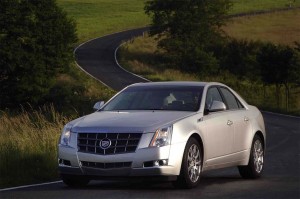
The Cadillac CTS is one of a few Detroit cars likely to gain sales under a new Japanese Clunkers program.
Bowing to heavy pressure, Japanese government regulators have lifted rules that would have barred American automakers from participating in that country’s own version of the Cash for Clunkers program.
The rules were seen as adding insult to injury considering that Japan has largely been closed to foreign makers, who have never been able to capture more than a tiny sliver of the Japanese market.
Asian importers reacted angrily, a year ago, when the U.S. Congress first considered adding rules to the American clunkers program that might have restricted sales of imports. Ultimately, Japanese brands accounted for 319,000 of the 677,000 vehicles sold through the program, formally known as the Cash Allowance Rebate System, or CARS.
During an appearance at Detroit’s North American International Auto Show, last week, U.S. Transportation Secretary Ray Lahood downplayed concerns about the restrictions enacted by Tokyo for its Clunkers program, but there were open rage within Congress, some members proposing what could have been retaliatory legislation.
Japan’s Clunkers campaign is aimed at ridding the roads of vehicles that are at least 13 years old – the American program accepted much newer vehicles. Trading in such a vehicle on a car that meets stringent new mileage standards will yield a $2,752 incentive. Motorists who don’t have a qualifying car to trade in will still get a government handout of $1,100.
The Japanese car market has shrunk by nearly half since the years of the so-called “Bubble Economy,” and volumes plunged 9.3%, last year, to just 4.6 million. So, demand for a stimulus package has been growing for months.
How much U.S. automakers will gain from the revised rules is unclear, though the answer is likely, “not much.” The Detroit Three imported just 2,000 vehicles to Japan, last year, and of those, only 40% would meet the mileage standard requirement for a Clunkers handout.
A Transportation Ministry official told the trade publication, Automotive News, he expected Detroit to pick up perhaps 700 additional sales for qualifying products, which include the Ford Escape, Cadillac CTS and Chrysler Grand Voyager.
On the whole, foreign makers have struggled in vain to crack the Japanese market. Total import sales were just 178,527, last year, a decline of 19%. A number of brands have pulled out of the market, over the years, including General Motors’ Saturn and, in 2009, Korea’s Hyundai.
Most offshore based automakers also decided to boycott the once-influential Tokyo Motor Show, last October, turning it into little more than a minor showcase for domestic brands.

This report was sincerely shocking. I say, why in the world would my America ever bow in to ANY countries demands in regards to OUR politics. Real American elected officials would have gone with Plan A. Only American cars to stimulate the American economy and that would in turn would have naturally done produced work. When one car is created, a countless number of American suppliers are involved.